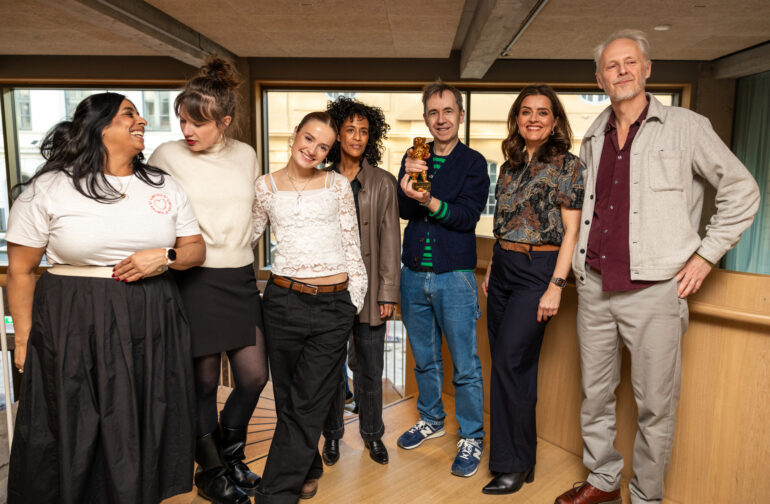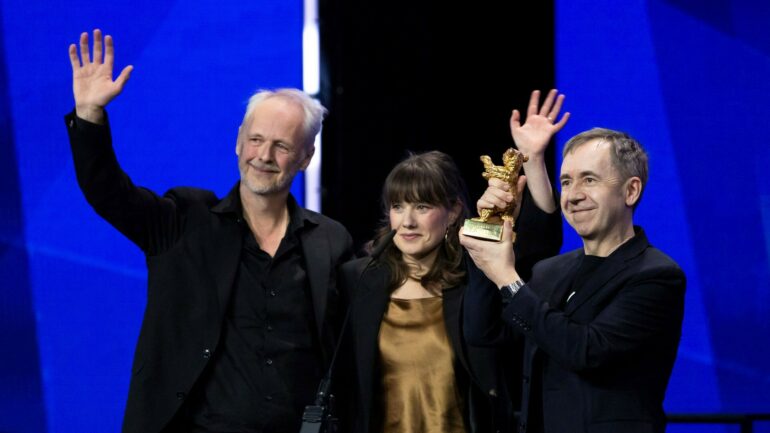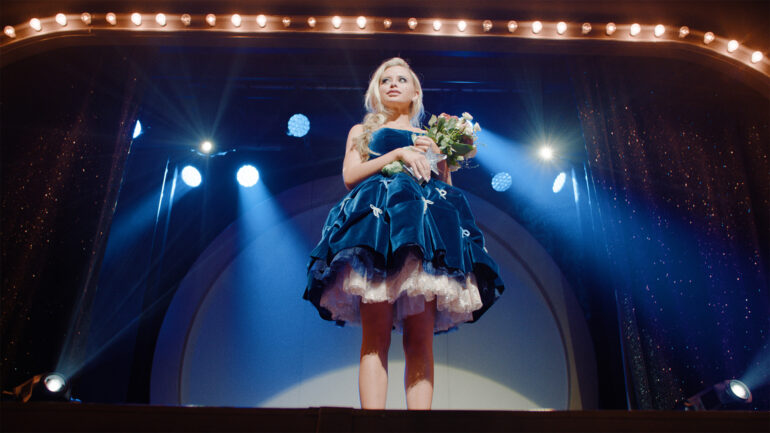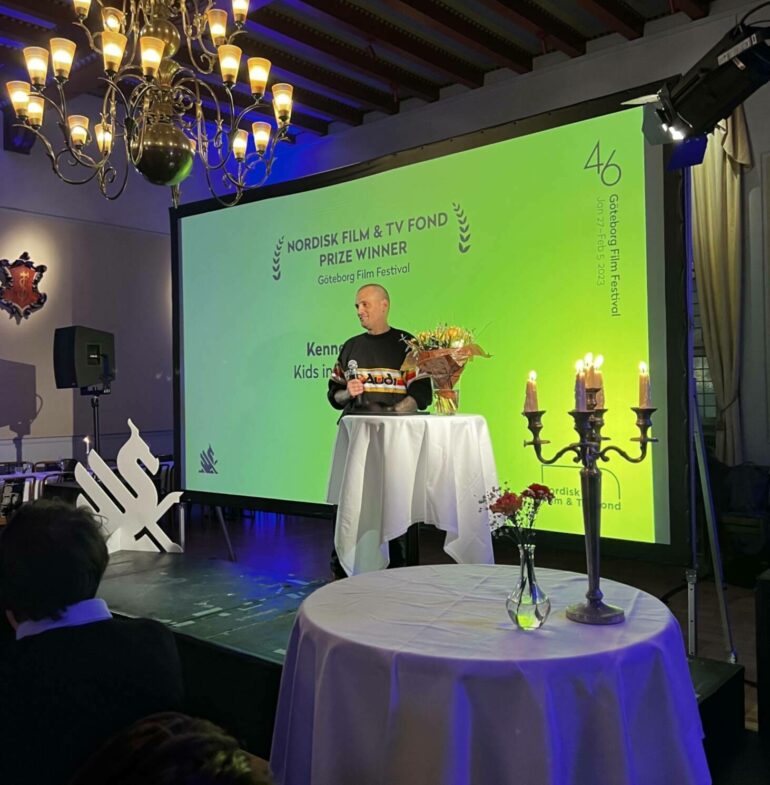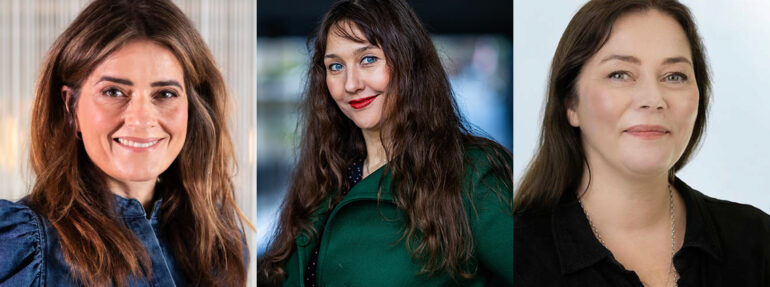Written by: Geoffrey Macnab
04.04.25
Is it a new Golden Age for Norway? With major festival prizes for both film and TV, Norwegian content is breaking through as never before.
In a long line of festival successes for Norwegian films at events from Cannes to Karlovy Vary, Dag Johan Haugerud’s latest feature Dreams (Sex Love) (Drømmer) produced by Norwegian Motlys, has just won the Golden Bear in Berlin. In 2024 the triology’s first part Sex won the Nordic Council Film Prize, while the political drama series Power Play (Makta), also produced by Motlys, won the Nordisk Film & TV Fond Prize for outstanding series writing.
Henriette Steenstrup’s Nepobaby, made for TV 2, is in competition at Cannesseries, as is A Better Man (Ølhunden Berit), created by Thomas Seeberg Torjussen. Requiem For Selina (Rekviem for Selina), created by Emmeline Berglund, has just picked up a prize at Series Mania.
Anticipation is now fast building for the premiere of Joachim Trier’s latest feature, Sentimental Value, sold to Neon in the US long before it was completed.
Below, Kjersti Mo, CEO of the Norwegian Film Institute (NFI), Alice Sommer, commercial station TV 2’s Head of Drama, and Marianne Furevold-Boland, Head of Drama at public broadcaster NRK, get to grips with the reasons behind the glory days for Norwegian film and TV.
What did the Golden Bear mean for the Norwegian film and TV sector on a symbolic level?
Mo:
It’s a huge deal for us, for Norwegian film, and also for the audience. This is really a recognition we have never had before. It puts us on the map in a way that opens a lot of doors. There are more distribution deals and also more opportunities for the filmmakers. They feel that there is an interest in Norwegian content. This is a confidence boost for the industry. It also shows that Norwegian stories really connect with the global audiences, and we are not used to that. For us, this is really new.go
Do you see this is a golden age?
Mo:
What is the definition of a golden age? What I know for sure is that what we see now has never happened before. When people call it a golden age, I might think they have a point, because there is so much great work coming from Norway right now. It feels like a moment where everything is coming together. I have to be honest - it is really exciting!
Sommer:
Norwegian film and television are currently thriving both nationally and internationally, and at TV 2 we are genuinely delighted by this success.
Furevold-Boland:
I think it is definitely a special moment. That said, I also believe we’ve been delivering high quality drama in film and television for many years already. It’s amazing that audiences, also internationally, are embracing Norwegian drama on TV and on film. We have been able to tell stories that the audiences feel are authentic and relevant to them at the same time as they are highly entertaining. Requiem For Selena, which has just won a prize in Series Mania, is a good example. It is highly entertaining. It feels very unique in its format and how it is being told, but at its core, it is actually a story about Norwegian society. It’s a kind of historical drama. We see ourselves how we were, where we are now, and use that to see into the future. Shows like State Of Happiness (Lykkeland), Power Play (Makta), and So Long, Marianne are also good examples of this.
Why are Norwegian stories breaking through internationally?
Mo:
They have a strong identity, but they are also universal in some ways. They are relevant to our times and how we live our lives now. It’s a combination of the support system, the professionalisation of the sector, and the creative nerve and ambition to do something different.
Sommer:
Our creative industries have mastered the balance between artistic uniqueness and commercial appeal, producing content – both scripted and non-scripted - that resonates locally as well as globally. Norway has always had a knack for taking creative risks. Coupled with a growing know-how of how to execute and finance costly projects in a sound manner, we are developing sustainable ways of producing attractive content that is both relevant to our Norwegian viewers and succeeds in engaging an international audience.
Furevold-Boland:
Primarily, we [at NRK] are making content for the Norwegian audience, because they are our owners. But that being said, I have had the joy of experiencing how a very local series has been embraced by the whole world, as we have seen with the success of Skam. I think if a story resonates with what it is like to be a human being, it can travel. We human beings are much more alike than we might think, and good storytelling will travel. Also, the audience is so much more open-minded and skilled in looking at content, that it [drama] doesn’t necessarily have to be in your native language.
How valued are Nordic collaborations in elevating Norwegian film and TV?
Furevold-Boland:
We are working very closely with our Nordic partners. We have this Nordvision partnership - between DR (Denmark), NRK (Norway), SVT (Sweden), Yle (Finland), and RÚV (Iceland). We are sharing content and co-producing each other’s programmes. They are also very good partners to talk to to make sure we are creating the best drama. It’s a very valuable friendship and collaboration.
Sommer:
The Scandi Alliance is a project-specific collaboration between Scandinavia’s largest commercial broadcasters, namely TV4, TV 2 Denmark, and TV 2 Norway. Our principal idea is to pursue and co-produce high end drama that may resonate with a large audience in all three countries. This is not a Sales & Acquisitions exchange deal, but a joint ambition to create original scandi-fiction that offers broad relevance and is organically rooted in our shared pan-scan culture.
By “going dutch” and co-producing with our neighbouring countries in this trilateral co-commissioning, we gain the opportunity to acquire exclusive Nordic rights for large scale drama that holds a broad Scandinavian relevance. At the same time this secures substantial financing for the producers. The ambition level held by projects such as Royal Blood(Blått Blod) **will not only appeal to our local audience, but holds a major potential to travel world wide.
In addition to the Scandi Alliance, we have recently ventured into a collaboration with Amazon Prime, co-producing the upcoming series Rinnan. By teaming up with a frenemy and lending each other “the best of two worlds”, we can accomplish results that solely may come from joining forces. Instead of ring fencing our own local projects, refusing to “share” them with anyone else, we recognise the win-win potential of partnering with other players.
Mo:
The Nordics are still very important to us. We are still digging even deeper into Nordic collaboration, but we also see that Europe is increasingly important in the big picture. We had these Nordic film days in Paris at the beginning of March, when we discussed a lot with the CNC about how we can collaborate more deeply with them. But we have always worked closely with our Nordic neighbours. Historically, it has helped us. We have been the little brother…being five small countries, we have had access to more resources, talent and funding [together]. It has been important for promoting our titles abroad. Now, we also use our joint platform to build a strong brand for our films and series. We are also expanding our collaboration into analysis, sustainability and financing.
How do you see the relationship between original and IP-based successes?
Mo:
We need both. We understand that well-known IPs help reduce risk for the stakeholders/producers, and we support that as well. But the most important thing for us is to find out what can attract audiences to the cinemas, and further develop the cinema audience. We have financed World War Two films, but we also want to finance the next types of films that draw audiences to the theatres.
Furevold-Boland:
I can only talk on behalf of NRK, but we have done both. Over the last couple years, we have probably had more original IP, but that’s coincidental in many ways. It’s about the project in itself.
Sommer:
The most successful and acclaimed Norwegian successes seem to be largely derived from original ideas. However, there are strong IPs that are lending themselves to adaptation, typically adhering to the more classical genres, such as crime and suspense. Also, our commonly shared reality and history have yielded “real life IP” to a growing number of scripted projects based on true events.
Where is the talent coming from?
Furevold-Boland:
At NRK, we aim to be brave and to work with talent that maybe hasn’t had so much experience. We place strong emphasis on talent development, and providing writers with opportunities to explore and develop ideas and projects at various stages.
The industry has given a lot of people a chance to learn. In recent years, when the production of drama series for a Norwegian audience was at its peak across broadcasters and streaming platforms, the industry had a unique opportunity to grow, experiment, and refine its craft. As a result, we've developed a mature and highly competent drama production environment, with strong creative and technical expertise.
This also has to do with believing in the talents’ vision. That is part of some of the success we have seen recently. We have given the talents trust and responsibility.
Sommer:
My impression on a general level is rather that proficiency is crucial. The local scripted projects that are trending or gaining traction these days, rely to a large degree on experienced talent, both creatively and executively. Established creative talent is still what’s driving the strongest projects. It takes substantial experience to spot new talent. I don’t believe we are facing a generational change, but rather a gradual evolution in which new talent is nurtured by learning from preceding mastery, perspicacity, and savoir-faire.
Mo:
We have been focusing on gender, equity, diversity and inclusion. Our philosophy is that talent is equally distributed in the population. When you have more diverse people being given opportunity, we will also see more talent.
Is Norwegian film and TV reaching younger viewers domestically?
Mo:
What we know about the young audience is that they will never become like us. Like most other people in the sector, we are really worried about the young audience. They consume media very differently from the generations before them. Most likely, we are going to adapt and become more like them, rather than the other way round. To understand their media habits, we are doing a lot of analysis. Of course we want to fund projects that will give them [young audiences] relevant and high quality content. We work at projects aimed at schools, and we also purchase rights for Norwegian films and documentaries to make them accessible through streaming services.The same with video games. We have a lot of measures. In our own cinematheque, we have young curators. This is top priority. If the young generation loses its relationship to local films, everything is going to be very, very difficult. From our perspective, it [Norwegian content] needs to be accessible on all platforms, We know that they [the young audience] only go to cinemas a few times a year. I want them to see Norwegian productions every day!
